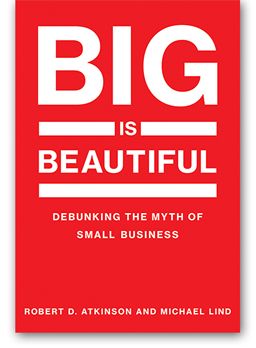Is Big Business Really That Bad?
This article, featured in the April 2018 issue of The Atlantic, is adapted from Atkinson and Lind's forthcoming book Big Is Beautiful: Debunking the Myth of Small Business (The MIT Press, 2018).
In 1952, Charles Wilson, then the president of General Motors, was nominated by Dwight Eisenhower to become secretary of defense. During his confirmation hearing, Wilson was asked whether, as secretary, he could make a decision adverse to GM’s interests. Wilson assured the chamber that he would always put the interests of citizens ahead of those of his company. He added that he could hardly imagine a situation in which the two would be in conflict: “I thought what was good for the country was good for General Motors, and vice versa.”

To contemporary ears, this may sound like standard C-suite spin. But this sunny view of Big Business was shared by the public. One 1950 poll found that 60 percent of Americans had a favorable opinion of large businesses; more than 70 percent had a favorable view of GM. “We believe today, both inside and outside the business world, that the business enterprise, especially the large business enterprise, exists for the sake of the contribution which it makes to the welfare of society as a whole,” the management scholar Peter Drucker wrote in 1952. “There is, in fact, no disagreement, except on the lunatic fringes of the Right and on the Left.”
Today, you need not travel to the lunatic fringes to find suspicion of Big Business. A majority of Americans now view large businesses as self-serving and self-dealing. Only 21 percent of respondents to a 2017 Gallup poll said they have a “great deal” or even “quite a lot” of confidence in Big Business.
How did large firms go from being a symbol of American strength to being the object of almost universal scorn? A series of high-profile corporate scandals—Enron’s accounting chicanery, Goldman Sachs’s manipulation of derivative markets, among others—certainly hasn’t burnished the image of Big Business. Nor has the rise of the shareholder-value movement, which tolerates no mission other than producing profits, preferably in the near term. The globalization of the economy has at the same time turned American corporations into multinational enterprises with interests that do sometimes run counter to those of their home country.
Small businesses, by contrast, have remained an exemplar of American ingenuity and pluck, the rare hero championed by both sides of the yawning political divide. To Republicans, they’re the purest expression of the creative potential of the free market; to Democrats, small businesses are a bulwark against the encroachments of greedy, heartless corporations.
Meanwhile, an influential school of scholars and advocates now blames a variety of ills—from stagnant wages and lagging productivity to growing income inequality—on the domination of markets by large firms. Channeling antique figures such as Louis Brandeis and William Jennings Bryan, this school claims that “monopoly” and “concentration” are rampant and that aggressive antitrust enforcement is the only cure.
Many of the evils identified by these reformers are real and must be addressed. But the diagnosis is wrong—and the prescription is malpractice. American admiration for small business is rooted in anachronistic ideals passed down from the nation’s preindustrial founding. Our reflexive disdain for large businesses exaggerates their malfeasance while misapprehending their vital role in continued American success. The problem isn’t merely one of perception: Feeding off the popular esteem for small business, policy makers are handicapping Big Business—in the process lowering productivity, dampening innovation, and hurting U.S. global competitiveness...
Editors’ Recommendations
November 12, 2017
Progressives Should Think Twice Before Demonizing Big Business
October 26, 2017
Antitrust and Innovation: What the Alarmists Get Wrong
April 16, 2018

